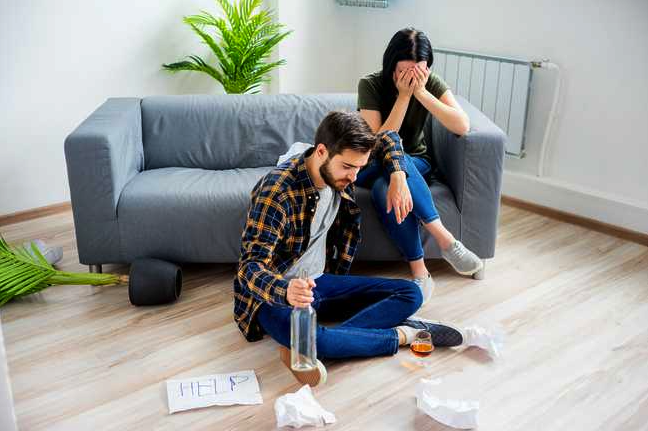Table of Contents
Drug and alcohol addiction are serious problems to overcome, but it’s never as simple as quitting on the spot. In fact, quitting without going through a proper detox is one of the most dangerous ways to get clean.
Addiction can be both physical and mental. The severity of withdrawal symptoms can vary wildly depending on the person and the type of substance being used.
For more severe drug addictions, a medical detox would be advised to fight off certain side effects. Something less severe, like nicotine addiction, usually doesn’t require the same kind of medical support.
How do you decide between home withdrawal or medical detox, and is home withdrawal safe?
Table of Contents
Home Withdrawal Considerations
Detoxing at home is a risky endeavor, despite the appeal.
You won’t have to spend a dime on a rehab center if you’re at home. There are also all the comforts your house naturally brings you, such as distractions through video games and the company of your friends and pets.
However, not all detoxes are as simple as waiting it out. Some drug withdrawals can be so severe that the addict runs right back to using just to avoid the symptoms. In other cases, the symptoms can cause heart distress or worse.
If you are doing a home withdrawal, prepare for the worst.
For the safest detox, try doing it with a family member or friend in the home who can call for medical help if you need it. Even if you don’t have any complications, you’ll most likely end up feeling drained throughout the process.
Another factor to consider is the success rate. If you’re at home, there’s a higher chance of relapsing than if you’re at a facility. You won’t have professional help to deal with your symptoms and you may give in to your drug cravings. Your friends may not be enough to stop you. Employees at a rehab center know how to deal with addicts.
The only time you should consider a home withdrawal is if you’re dealing with a milder substance abuse problem, like smoking or drinking. You should follow up an alcohol detox with an AA program.
Medical Detox
The biggest advantage of a medical detox vs home withdrawal is safety. Even if you don’t have any pre-existing medical conditions, anything can happen when you’re having withdrawal symptoms at home. In a medical space, there are professionals waiting to help out in the case of an emergency.
Alcohol Detox
Despite its legal status, alcohol can cause some serious damage to your brain and body if not consumed responsibly. One syndrome you can develop, called Wet Brain Syndrome, is the result of a vitamin deficiency linked to long-term heavy drinking.
In the short term, you may have general confusion and loss of muscle coordination. In the long term, you could suffer from memory issues.
Alcohol detox at a rehab center is recommended if you have previously struggled with overcoming your addiction in the past. A drug rehabilitation specialist can help get the assistance and advice needed.
Various rehab centers come in distractions such as yoga and meditation to get your mind off your addiction and licensed therapists to keep you on the path to recovery.
Drug Detox
For proper drug detox, there is no safer alternative to medical detox.
There are some potential at-home remedies that are recommended, such as using distraction techniques or taking ibuprofen to reduce muscle aching. Zofran and Imodium can help with nausea and diarrhea. These techniques don’t work as well with harder drugs, such as heroin or cocaine.
The problem with drug detox is that the withdrawals can be much more severe than alcohol or nicotine withdrawals.
Medications can help ease the physical side effects, while substance abuse therapies deal with the mental issues that resulted in the addiction. There will also be medically trained experts nearby at all times for when your withdrawal symptoms cause heart or lung issues.
Medical Detox vs Home Withdrawal
When comparing a medical detox with a home withdrawal, you should consider the severity of the addiction, the type of substance addiction, and your own support network.
Most importantly, a rehab center can provide a support network if you lack one. An example of this is a sponsor in AA. They make sure you don’t slip up, and you do the same for them.
Choosing a Rehab Center
Many considerations should go into deciding on a rehab center, such as its location, accommodations, and budget.
If your current support network is close by, you might want to pick a facility close to them. Conversely, it might be wise to pick a facility far away from bad influences.
Although a rehab center may treat alcoholism and other addictions, it may not be well equipped for mental health disorders. You want to choose one that is accommodating to your specific challenges.
It’s also important that you pick something within your budget. While you shouldn’t be afraid to spend a bit more for higher quality care, you also don’t want to add financial debt to your current list of stressors. Insurance can help, but you can also choose a state-funded treatment center if you need to.
Do the Research
Whether you opt for a medical detox program or intend to suffer through a home withdrawal, always do research in advance.
A home withdrawal can be a challenge and is better suited for less severe addictions. For more intense physical and mental dependencies, a rehab center is worth the investment for long-term results.
Are you interested in learning more about treatment programs and interventions in the Long Island area? Reach out to our staff today and get the answers you need to start your recovery.
Get Help Today
Don’t go through the process of recovery alone. There are people who can help you with the struggle you’re facing. Get in touch with one today.



